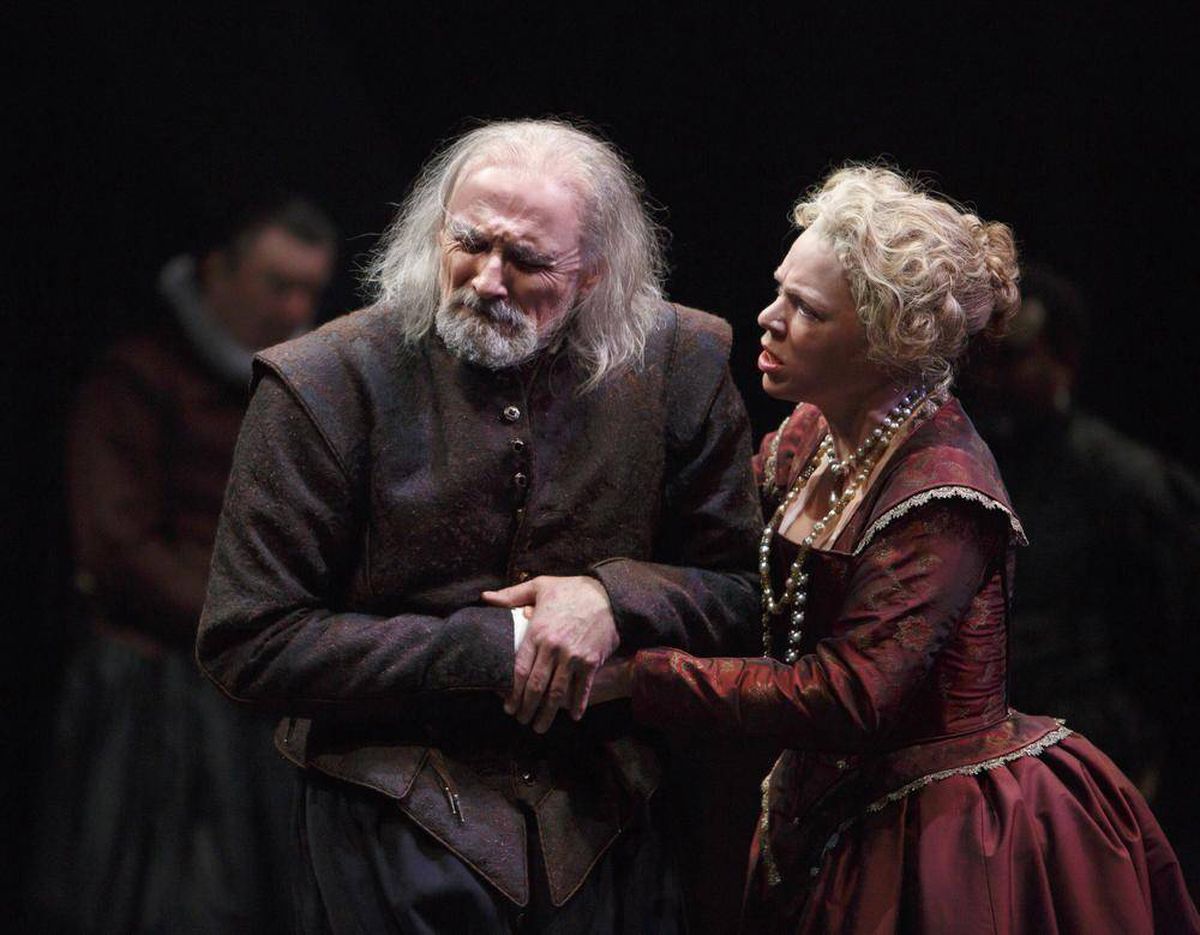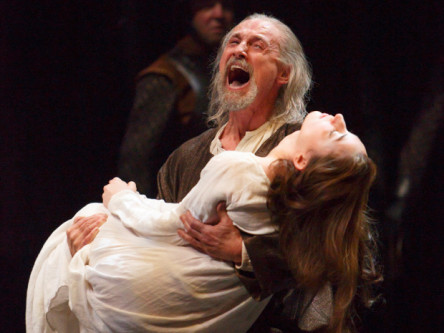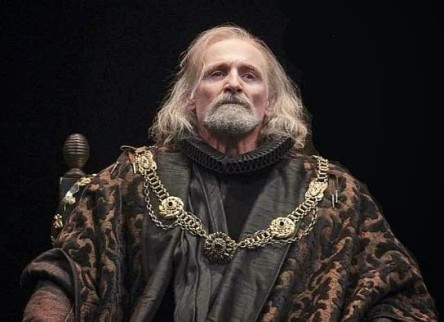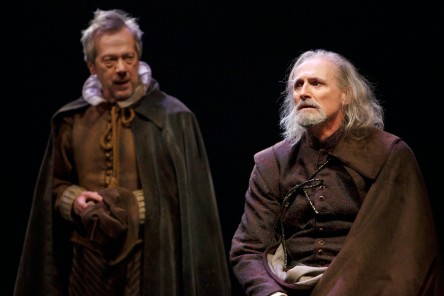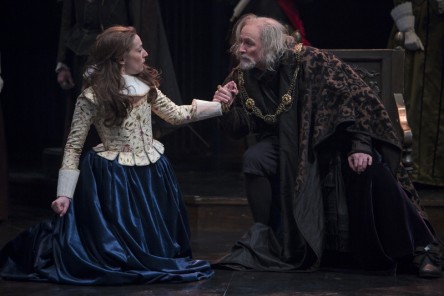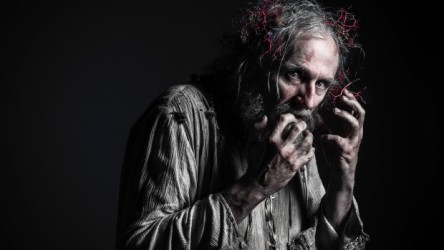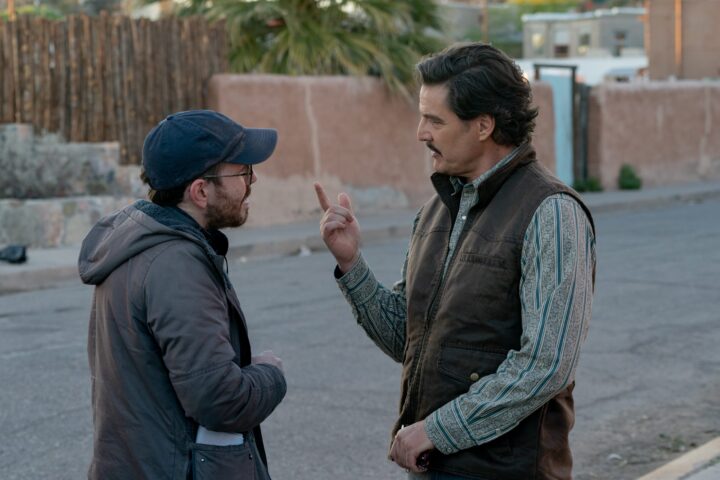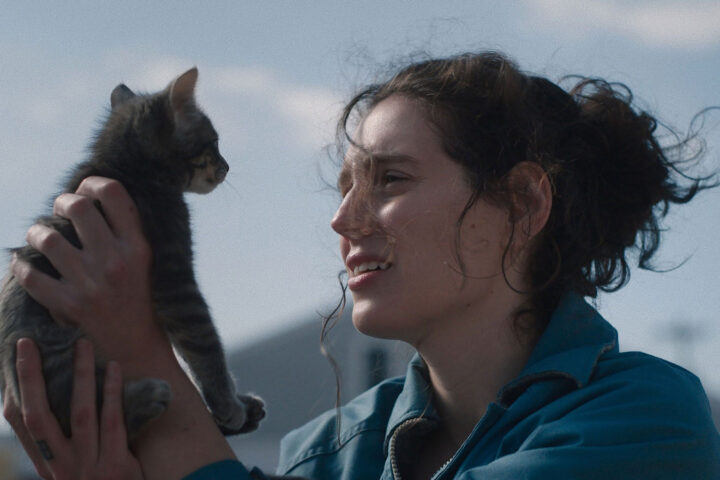Colm Feore’s towering, career-defining work as King Lear in Stratford Festival’s currently playing movie adaptation of last summer’s theatrical production is a raw, powerful portrait of Lear as a man of family and state, in that order, a younger and more vigorously vital patriarch who loses his daughters, country and mind in an emotional production from director Anthony Cimonlino. It is in all regards a deeply-felt depiction of the greatest patriarchal fall in literature, and to see the 56-year-old star drain his considerable emotional reserves alternately acidic and commanding, tender and bewildered, is, frankly, astonishing.
The production, with its underlined familial relationships and modern relevance about family decisions on aging and irrelevance, loyalty and betrayal, gives Feore—the thirty-year Stratford veteran and star of scores of television and Hollywood movies, including his memorable evil incarnate in Stephen King’s Storm of the Century and some very successful populist escapism like Thor, Jack Ryan: Shadow Recruit, The Chronicles of Riddick and The Amazing Spiderman 2—an early career opportunity at the iconic role of Shakespeare’s fallen king, and his work is potently visceral for three solid hours.
I caught up with Colm Feore recently to discuss the challenges of taking on such an exhausting endeavor, the modern relevance in the text and thoughts on his career shuttling between Stratford and the screen.
King Lear has to be the most daunting undertaking. Where do you start?
We started about a year and a half before rehearsals, and director Anthony Cimolino is also the artistic director of the theater. Lear came up, and we said it would be a dumb idea and I didn’t feel senior in any way. The more I started researching the great actors that I respected and admired and when they did it; guys like Paul Scofield, who started doing it at 40, filmed it around 50 with Patrick McGee and Irene Worth, I thought “Well, then we don’t just need to be old.” But it is so damned hard to do. It takes so much physical and emotional energy.
And pathos.
Oh my god. And if you go as far as it demands, people are left heartbroken and speechless. To me, it’s the greatest ending of a Shakespeare play. It’s just over. And so it’s so correct from an emotional point of view. They are shattered and numb. We wanted to just explore that horrible, post-catastrophe moment where people were in shock. Soon after, the machinery of the state will get society moving forward again, but for now we are too shattered. So we thought, maybe you need a younger man’s energy to push really hard and find the depth here. So we decided to do it.
This play can emphasize politics and power plays and be mounted as an epic tragedy but this production amps up the emotional and relationship impact.
They are critical, absolutely. We also didn’t approach it from the idea that there were two bad sisters and one good sister. It doesn’t happen like that in real families. People have the relationships they have with their parents. Some are closer, some are more distant; cooler. Family dynamics are instantly recognizable to all of us. So when we see these girls put into desperately bad situations, we can kind of understand why they behave badly. Lear right now is a great play that speaks to people of middle age who have still living, aged parents and also children, and are caught between these two worlds taking care of both, and how those demands can make you crazy. What do you do? And if mom and dad have an army behind them, it makes your suggestion that they should just sit quietly in a rocking chair by the fireplace and enjoy their golden years a very difficult sell. So the audience suddenly sees the girls pushed into making worse and worse choices. Cordelia, in order to not make a choice worse than the one she already has made, has to leave the country, and Lear is then left alone to ask how he got things so wrong and didn’t know those people: “I thought they loved me. I’m king and father.” But when he gives up the role of king, he still has father which you would think is a guaranteed advance to the second round. And it isn’t. And as an audience we see how complicated it is, but also that it’s a human domestic story that resonates with people.
The aging parents theme is very clear here, about how we must face parents who may experience dementia or begin to decline, and what we must do.
Those are the lines. We took all of our cues from the text. Shakespeare is so good about giving stage directions even if they are subtle. He says that when Lear sees Cordelia, she is a ghost, He’s afraid to acknowledge her because then he will feel overwhelmed and unable to cope. The lines say that a noble or regal shame pushes him from himself when he thinks about her, and that he goes slightly crazy. He can’t acknowledge her, but then he says, “I think I should know you.” And then we realize this is not a game. He understands that he knows a person who used to look like that, but he just hasn’t got a solid grasp on it. That is so human and recognizable in Alzheimer’s today, and all of the various forms of dementia that are being understood in completely new way that hundreds of years ago we’d have said was just slightly batty. Shakespeare marks this decline meticulously, almost clinically in his downfall, where everything happens just a minute too late. How many times have we heard now that people say they have got their mom or dad in these places, and they go every week and they are not recognized, and they hope they are doing the right thing? But they have their own kids to take care of now and have to look forward rather than back. So that kind of moral complexity is all reflected in this 450 year-old play.
Maev Beaty is remarkable as Goneril in the way she navigates these scenes, particularly that brilliant moment where Lear curses her womb.
We were very lucky to have her come and play Goneril, not least of which because she looks very much like she could be my daughter. (Imagining Lear’s back story) And she was my first, and I think I wanted a boy so I think I called her Gonnie and I made her go hunt in the field with me. I made her do stuff that she didn’t want to do. I didn’t let her be girly. I let the second one be girly. You can see those relationships. Lear starts by dividing the kingdom in three, and this is an absurd contest and a game that a silly old man is playing. But he says to her, “This is for you, love, and all of your children and Albany, this is for my legacy and our family tree, beginning with you. Be fruitful and multiply.” So it’s a loving, positive, forward thinking thing. Not two scenes later he says, “I hope your womb dries up and falls on the floor. I want the gods to shrivel you up inside, and I want nothing good to come out of you. And if something does, I want it to be a hateful, horrible, dwarf creature.”
He understood women perfectly with the line, “Turn all her mother’s pains and benefits to laughter and contempt.” It’s the contradictory thing women go through when they have a baby. It’s horrible and painful, and then there is this rush of emotions that make her say, “I can do this again.” And then you say, “No, you’ve forgotten. Maybe I should show you the pictures of what you just went through.” When we were rehearing that scene, I was trying to find a way to allow Maev to discover the worst parts of herself without having to come up with something evil. And Shakespeare showed me the way by making me behave more and more badly toward her in every line—call her another name, insult her and then abuse her. And finally one day in rehearsal, I came up behind her, grabbed her womb and clutched her to me, pressing her against me with all of my strength. I would not release her until I was ready, and then I threw her on the floor. You have to trust actors are going to go with these things. And what that gave us, and certainly for Maev, was the close-up on her in front of me with her womb being essentially ripped out by her father. It made people want to vomit. Every time I would go off the stage I would almost throw up.
Was the film version, which features a close-up of her face, the first time you had seen that reaction?
Yes! And so it’s a horrible thing to do to somebody, but if I’m watching it I understand where she is coming from. She says, “I know his heart.” And when Maev said that and you saw how much he hurt her, that added all of those layers of complexity, and an actress of her breadth and depth just had it right there. We were so blessed with that.
There is gentle humor throughout, much of it courtesy of Stephen Ouimette as the Fool.
He is extraordinary. Often the mistake is made that the Fool somehow try to be funny. But what he says is always true, and Lear because he knows him and needs someone to tell him the truth where everyone else lies to him, the Fool can say quietly, “That is the stupidest thing you have ever done.” So there is a delicate, intimate friendship to them. They are about the same age. He is more intimate with him that anyone else. He shares the truth with him more than anyone else. Stephen is a genius and came on and effortlessly spoke truth to power. Lear knows that the only one who can do this is the all-licensed Fool, and they have a codependency. And every time Lear says, “It’s going to get better,” the Fool says, “You just ruined your life. You’re an idiot.” And I thought the best way to have the audience understand this dynamic was to articulate it with the movements and the words. So we see why he puts up with the Fool and vice-versa, until the Fool says, “I can’t work for you anymore. There’s nothing. I’m done.” The way Stephen did it, I thought, was heartbreaking.
I first saw King Lear in 1990 at the Blackstone here in Chicago, with Kenneth Branagh and his production from the Renaissance Theater Company, featuring Emma Thompson as the Fool. But it doesn’t seem to be done that often.
I saw that too! Richard Briers was amazing. It’s a very hard play to do and you have to have somebody the director thinks should do it at time in his life, but it also has to have some resonance in society. It has to make sense for now. Because even if it’s not dressed in modern dress, it still has to hit.
There was a very funny joke made about proper succession planning prior to the film last night.
If you do it right, you won’t end up like Lear!
You must have some personal connection to the role in order to give it so much. Do you have daughters?
My youngest is a girl, and I had a picture of her in my dressing room from the beginning, always looking for her to be the anchor. Luckily enough, Sara Farb, who played Cordelia, looks a bit like my daughter. And that transference was easy. My daughter, Anna, is not afraid to stand up to me and call me a buffoon! And then I always realize I should behave better. That was very handy. I have two boys, so I do have the three required kids for getting into this! But finally, I have always loved Shakespeare and had a connection to it. Thirty years ago, I was in Chicago touring with King Lear and did a residence for a month with Twelfth Night and King Lear. It gets into your blood and becomes the go-to place for understanding the world. It became a kind of anchor for my career.
What’s the best part about your job?
All the money I save in therapy, because I get to use the theater and the experience of each play, particularly King Lear, to purge the “what if” possibilities of trouble at home, worry about children, the constant terror of what, if anything, will they become, how they will survive and thrive, what the future holds and how can I guarantee it, and who am I anyway? All of that stuff is so effortlessly there in Shakespeare that as an actor, if you invest yourself in it completely you actually come out kind of normal at the end. There is only one way to do it, and that is fully and completely. At the end of every King Lear I was utterly shattered, exhausted and exhilarated. I went out there and said, “I don’t give a shit.” I’m going to go for it and see what happens, and if my voice goes crazy, if I lose it, if I fall and break an arm, if I piss my pants—fine. That’s what is going to happen, live, right here and now.”
We would sell out with audiences coming in out of the hot August sun to sit and cry. I don’t know why! I’m so glad they came, though! I could see and feel instantly that they got what we were talking about. If there were little kids in the house, I would always go down and shake their hands at the curtain call and say, “Thank you for coming. Thank you for staying awake. Please come again.” And hopefully cementing in their heads, “You know this Shakespeare thing? I got it. One day, when I was ten, the guy who played King Lear came down and told me to come back and talk about what this stuff means, and how to enjoy it.”
For decades, you have been prolific in movies—including several blockbusters—and television as well. Do you approach them differently?
I approach most of the work exactly the same. I use the same process as with Shakespeare, writing out all of the lines, studying the scenes and debating as much as I can with the director and rehearing, though in film and television that’s a luxury so you have to show up ready. And Shakespeare has helped me with that. You come with a blueprint of how good text and stories work, and how to get immediately to some emotional pitch, and things have to be honest because the camera is right up your nose. So I find they have cross-pollinated really effectively. I don’t have a favorite, but I like the variety.
Do you find the majority of film actors take such an approach?
Some people are just naturally great film actors and they have come from a different angle. I came from the theater, and that is my foundation, and I found it useful. But I’ve worked with people who have never been on a stage in their lives, and they are wonderfully effortless performers. It takes all kinds, and in the end we all have to find some kind of homogenous way of doing it together and look like we are in the same movie or television show, and we have to be on the same page.
You were born in America, but somehow I felt you were Canadian.
I’m both. My Irish parents got off the boat in New York and got married there. My dad was specializing in radiology in Boston, and clearly they had some time on their hands and I was born in Boston. Then he was looking for work and my mom said, “I’m going back to Ireland,” so I decamped back with her until he got a job. And the first job he got was in Ottawa. So we met him there. I’ve been both for a long time. I became a Canadian officially not too long before I was to play a Canadian prime minister, because I thought it would be churlish not to show my commitment to it!
What would you like to do at Stratford that you have not yet accomplished?
I’ve been very fortunate to have played all of the great parts. There are a couple left over. I haven’t done an Antony yet, and that will have to wait for a bit. But I think probably I will want to revisit some I did twenty or thirty years ago that I might have been young for or that I know a greater deal about now than I did then.
